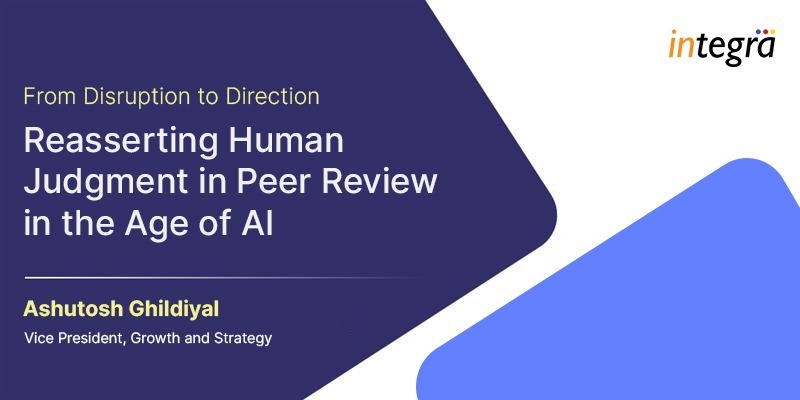AI in Scholarly Publishing: A Practical Guide for Human-Centered Implementation

The scholarly publishing community finds itself at a critical juncture. As AI tools proliferate across our workflows, we must navigate between embracing efficiency and preserving the human expertise that forms the foundation of scholarly trust. Based on emerging best practices and thoughtful analysis from industry leaders, here’s a practical framework for when and how to integrate AI responsibly.
The Core Principle: AI as Assistant, Not Replacement
The fundamental rule is simple: AI should amplify human judgment, never replace it. Think of AI like a research assistant, valuable for handling routine tasks and providing initial analysis, but never given the authority to make final decisions about scholarly content.
Where AI Can Add Value: The Green Zone
Manuscript Screening and Initial Assessment
- Use AI for: Checking basic formatting requirements, identifying obvious technical issues, flagging potential research integrity concerns
- Human oversight: Always required to interpret flags and make acceptance/rejection decisions
- Example: An AI tool flags unusual statistical patterns, but a human reviewer determines whether this indicates problems or innovative methodology
Language Editing and Technical Formatting
- Use AI for: Grammar checking, citation formatting, basic language improvement for non-native speakers
- Human oversight: Essential for reviewing all changes to ensure meaning isn’t altered
- Best practice: Treat AI edits as suggestions, not automatic implementations
Reviewer Matching and Administrative Tasks
- Use AI for: Initial screening of reviewer expertise against manuscript topics, managing reviewer workloads
- Human oversight: Final reviewer selection should always involve editorial judgment about fit, availability, and potential conflicts
- Benefit: Saves editors time on administrative matching while preserving their decision-making authority
Research Integrity Checks
- Use AI for: Cross-referencing against databases for similarity detection, checking for image manipulation, verifying statistical consistency
- Human oversight: Interpreting results requires understanding of disciplinary norms and legitimate variations
- Value: Provides objective data points that inform human judgment
Thought Partnership and Brainstorming
- Use AI for: Exploring ideas when colleagues aren’t available, organizing thoughts, identifying potential blind spots
- Human control: You initiate the conversation, provide context, and evaluate outputs critically
- Key principle: Use AI to enhance your thinking, not to do your thinking for you
Where Human Judgment Must Prevail: The Red Zone
Final Editorial Decisions
Never delegate to AI: Decisions about manuscript acceptance, rejection, or revision requirements
Why: These decisions require understanding of field priorities, reader needs, and journal positioning that AI cannot assess
Peer Review Evaluation and Synthesis
Never delegate to AI: Writing or substantially generating peer review reports
Why: Peer review requires attention, contextual understanding, and the ability to perceive meaning and originality, uniquely human capacities
Strategic Content Curation
Never delegate to AI: Decisions about special issues, editorial priorities, or what constitutes significant contributions to a field
Why: These require deep understanding of disciplinary evolution and reader communities
Research Integrity Investigations
Never delegate to AI: Final determinations about misconduct, plagiarism, or ethical violations
Why: These require nuanced judgment about intent, context, and disciplinary standards
The Implementation Framework: Three Questions
Before introducing any AI tool, ask:
- Does this preserve human agency? The human user should remain in control, making choices about what to accept or reject from AI suggestions.
- Does this enhance rather than replace critical thinking? The tool should free up mental bandwidth for higher-order judgment, not eliminate the need for it.
- Does this maintain the integrity of scholarly discourse? The final output should reflect genuine human insight and evaluation, even if AI assisted in the process.
Best Practices for Responsible AI Integration
Create Guardrails
- Implement AI tools within controlled environments where copy-paste functionality can be limited
- Establish clear policies about disclosure when AI has been used in any aspect of the editorial or review process
- Provide training on AI limitations and proper oversight techniques
Preserve Independent Judgment
- Design workflows that require human review at key decision points
- Encourage reviewers and editors to form their own impressions before consulting AI analysis
- Maintain “distraction-free” environments where human attention can focus deeply on manuscript evaluation
Maintain Transparency
- Be open about where AI tools are being used in your editorial process
- Distinguish between AI-assisted tasks (acceptable with oversight) and AI-generated content (problematic for core editorial functions)
- Regularly evaluate whether AI use is improving or degrading the quality of editorial decisions
The Attention Economy: Why Human Focus Matters More Than Ever
In an age of digital distraction and AI convenience, sustained human attention has become increasingly rare, and valuable. The core work of scholarly publishing, discerning quality, originality, and meaning, cannot be rushed or automated. It requires the kind of deep, patient attention that allows reviewers and editors to perceive nuance and make connections that AI cannot.
This means that even as we use AI to handle routine tasks, we must zealously protect time and mental space for the human work that really matters: reading carefully, thinking deeply, and exercising judgment.
Moving Forward: A Human-Centered Approach
The goal isn’t to resist AI or to embrace it uncritically. Instead, we should approach it strategically, always asking: How can these tools help us do better human work?
When implemented thoughtfully, AI can free editors and reviewers from tedious tasks, allowing them to focus on what they do best, understanding context, perceiving meaning, and making nuanced judgments that preserve the integrity of scholarly discourse.
The future of scholarly publishing depends not on choosing between humans and AI, but on choosing how to use AI in service of human expertise, creativity, and judgment. Let’s make those choices consciously, with the long-term health of scholarly communication as our guide.
This guidance synthesizes insights from ongoing discussions about AI’s role in scholarly publishing. As the technology and our understanding of it evolve, these recommendations should be revisited and refined based on emerging evidence and community experience.
At Integra, we celebrate the contributions of editorial professionals, recognizing their invaluable service to the scholarly community. Our advanced tools empower them, ensuring they continue to play a crucial role in advancing human knowledge through research. As a trusted partner, we offer human-led, technology-assisted solutions tailored for editorial, research integrity, and peer review management.
About the Author:
Ashutosh Ghildiyal is a strategic leader in scholarly publishing and currently serves as Vice President of Growth & Strategy at Integra. With over two decades of international experience, he has driven sustainable growth and built impactful partnerships across global markets. Widely recognized as a thought leader, Ashutosh contributes regularly to The Scholarly Kitchen, Science Editor, and Research Information, writing on topics such as AI, peer review, research integrity, and the evolving future of academic publishing. His work is grounded in a deep commitment to human-centered AI, reader-first publishing models, and empathetic, trust-based leadership.
Recent Blogs

Why LaTeX Still Matters in Scholarly Publishing—and How the Right Partner Makes All the Difference

Print, Pedagogy, and AI: The New Architecture of Educational Publishing


